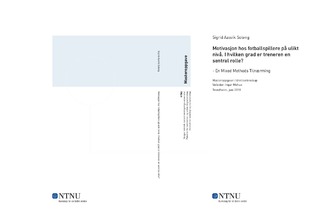| dc.contributor.advisor | Mehus, Ingar | |
| dc.contributor.author | Soleng, Sigrid Aasvik | |
| dc.date.accessioned | 2018-10-02T07:21:38Z | |
| dc.date.available | 2018-10-02T07:21:38Z | |
| dc.date.issued | 2018 | |
| dc.identifier.uri | http://hdl.handle.net/11250/2565608 | |
| dc.description.abstract | Purpose: The purpose of this study was to investigate motivation in football with Ryan and Deci´s (1985) ”Self Determination theory” as a framework. The goal was to study what characterized the motivation in football players on elite- and recreational level, and to what degree they experienced the coach as an important factor.
Method: The study is based on a mixed method approach, where 136 athletes on the elite level (n=58) and recreational level (n=78) completed Norwegian versions of the questionnaires BPNES and BREQ-3. Seven group-interviews were also done on the elite level (n=4) and the recreational level (n=3). Processing and analyses of the quantitative data was done in the statistical program STATA, which resulted in a logistic regression analyses. Analyses of the group-interviews were done with a thematic-analyses-approach.
Results: The quantitative findings showed that competence and integrated regulation significantly increased the chance of being an elite athlete, whilst intrinsic motivation significantly decreased the chance of being an elite athlete. Relatedness had a curvature effect on the chance of being an elite athlete, where the highest chance was at 3.96. The qualitative analyses revealed that the groups could be distinguished on multiple areas regarding goal content, causality orientation and need-satisfaction. The main findings showed that the coach was important through autonomy-support, involvement and structure. For the elite athletes the coach was important for the athletes´ motivation through recognizing the athletes as a whole person and mutual autonomy-support in their relationship. A coach that listens and take into account different perspectives proved important for both groups.
Summary: This study shows that the role of the coach plays out different in the two groups´ motivation. The elite football creates an environment that predisposes the athletes to controlling and extrinsic elements, and in doing so reflecting integrated regulation. Recreational athletes experience less extrinsic elements and are therefore predisposed for higher levels of intrinsic motivation. | nb_NO |
| dc.description.abstract | Hensikt: Denne studien hadde som hensikt å se på motivasjon i fotball gjennom ”SelfDetermination Theory” utviklet av Deci og Ryan (1985b). Målet var å undersøke hva som kjennetegnet motivasjonen til fotballspillere på elite- og breddenivå, og i hvilken grad de opplevde treneren som en sentral faktor.
Metode: Studien baserte seg dermed på en mixed methods tilnærming der 136 utøvere på elitenivå (n=58) og breddenivå (n=78) gjennomførte norske versjoner av spørreundersøkelsene BPNES og BREQ-3. Det ble også gjennomført syv gruppeintervju på elitenivå (n=4) og breddenivå (n=3). Bearbeiding og analyse av kvantitativ data ble gjort i statistikkprogrammet STATA som resulterte i en logistisk regresjonsmodell, mens analyse av gruppeintervjuene ble gjort ved hjelp av en tematisk analyse.
Resultater: Studiens kvantitative resultater viste at kompetanse og integrert regulering hadde en signifikant påvirkning for økning i sjansen for å havne i elitegruppen, mens indre motivasjon hadde en signifikant redusering i sjansen for å havne i elitegruppen. Tilhørighet viste seg å ha en signifikant kurvlineær påvirkning på sjansen for å være eliteutøver, der sjansen var størst ved punktet 3,96. De kvalitative analysene avdekket at gruppene kunne skilles på flere områder knyttet til målinnhold, kausal orientering og behovstilfredsstillelse. Hovedfunnene viste at treneren var sentral gjennom autonomistøtte, involvering og struktur. For eliteutøvere var treneren sentral for utøverens motivasjon ved å anerkjenne utøverne som et helt menneske og gjensidig autonomistøtte. En trener som lytter og tar hensyn til ulike perspektiver viste en sentral rolle for begge gruppene.
Oppsummering: Funnene i denne studien viser at trenerens rolle utspiller seg forskjellig hos gruppenes motivasjon. Elitefotballen skaper en kontekst som gjør utøvere bedre mottakelig for kontrollerende og ytre elementer og på den måten gjenspeiles i integrert regulering. Breddeutøvere opplever mindre slike elementer og er derfor bedre rustet for indre motivasjon. | nb_NO |
| dc.language.iso | nob | nb_NO |
| dc.publisher | NTNU | nb_NO |
| dc.title | Motivasjon hos fotballspillere på ulikt nivå - I hvilken grad er treneren en sentral rolle? - En Mixed Methods Tilnærming | nb_NO |
| dc.type | Master thesis | nb_NO |
| dc.subject.nsi | VDP::Samfunnsvitenskap: 200 | nb_NO |
| dc.subject.nsi | VDP::Samfunnsvitenskap: 200::Samfunnsvitenskapelige idrettsfag: 330 | nb_NO |
